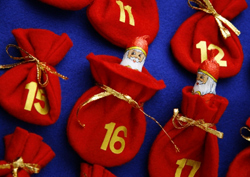In defending Christmas I have nothing to say about Jesus Christ, a terrifying and influential historical figure who, I confess, has had little impact on my life. My Christmas, the Christmas I have known, revolves centrally around objects — most crucially around presents and then secondarily around things like Christmas trees, ornaments, decorations, advent calendars, etc., and people — the people I’ve known, the family members whose faces come most quickly to mind when I smell pine needles, as if their faces are the secret look of pine needles and the two are united forever in a correspondence that is prior to history, understanding, or even my own awareness.
I have a particularly vivid memory of a childhood Christmas during which my sister would stalk the Christmas tree day after day counting presents. On the final day she made a stack in the middle of the room. On one side were the presents with her name on them and on the other, those with mine. She tallied them up. The number was not to her liking. I can still picture the stunned calm as she counted and counted again. But there was nothing to be done. It was clear that my pile was two presents larger than hers. I think it was the “two” that really bothered her. A difference of one is one thing, a difference of two is quite another. When there was nothing more to be done she gathered herself up, collected her faculties, as it were, and then proceeded to throw an epic and violent fit. Right there. She screamed and raged, she tore paper and hurled objects. Her little face took on the specific pallor and twist of mythical figures, semi-human things on frescoes buried in ruins—the shards of lost time. She dashed her head, as only she could, on the kitchen floor, her beautiful blond curls bouncing up and down against the tile and mixing with the tears and saliva. She grunted things that couldn’t be understood. I say again that this is one of the clearest memories of my childhood. She was magnificent, glorious, as she took up arms against a sea of troubles. She was having no bullshit whatsoever. She wanted the presents that were due her.
In my 20s, living in that odd no man’s land of Williamsburg, Brooklyn, when those of a Polish persuasion were still the majority population, I stumbled onto the L Train station in the evening during a snow storm. A smattering of people stood on the platform waiting for the train. A hearty Polish woman was singing Christmas carols in high operatic fashion as a rather more gnarled gentleman accompanied on his accordion. It was probably the exact temperature in the air, and the way it carried her voice, and the sound of the accordion around and around the underground chamber. The train came and no one got on it. No one said anything. We just stood there, we could do no other. The accordionist was drunk and kept trying to hang a candy cane on his nose during breaks in the music.
Walter Benjamin once wrote about his fear of clocks and the marching homogenous units of time they represent. He wrote of fighters during the July Revolution who suddenly turned their guns on the clock towers, trying to freeze the day, to get as much as they possibly could from those moments beyond the normal flow of history. There is no figure with a greater hold on the childhood imagination than Santa Claus. We have given him extraordinary powers. He has mastery, for a night, that isn’t exactly a night really, over space and time itself, the very fundaments for the possibility of anything else. In the Greek pantheon the God of time, Chronos, is an elemental God, more powerful than the Olympians, more primal than the deities who control things on land and sea and earth and sky. Chronos is beyond them because he is presupposed by them. But on his night, Santa stretches time and warps and weaves space to his own liking. He is his own logic and purpose for one infinite night every year. One night that is allowed to rip itself from the continuum and to exist all on its own, a mystery and damnation to all the clocks ticking away below.
I remember that there were always advent calendars. They were their own form of torture in that they seemed to progress so very, very slowly. After the 15th, it was as if each day refused to end, refused to give way to the next morning. We wanted to destroy the night. Opening each door in the morning was a mean pleasure. My sister and I would do it slowly, with an inchoate sense of the sacred. When I went away to college a package came at the end of November. I opened it. There was an advent calendar inside. I called my sister. She had one too. Later, my parents split up and then divorced and certain things from the past seemed now sealed in the past forever. But then late November would come and a package would come. It was only then that I noticed that the packages were from my father. The advent calendar hadn’t been from anyone before, it just arrived in the house. Now it had a return address. I had an image suddenly of my sister and me crouched in front of the advent calendar slowly opening one of the doors as my father stood behind us, unnoticed, silently looking on. Every late November for years and years now, there is a package. And there is an advent calendar from my father. • 29 November 2007




